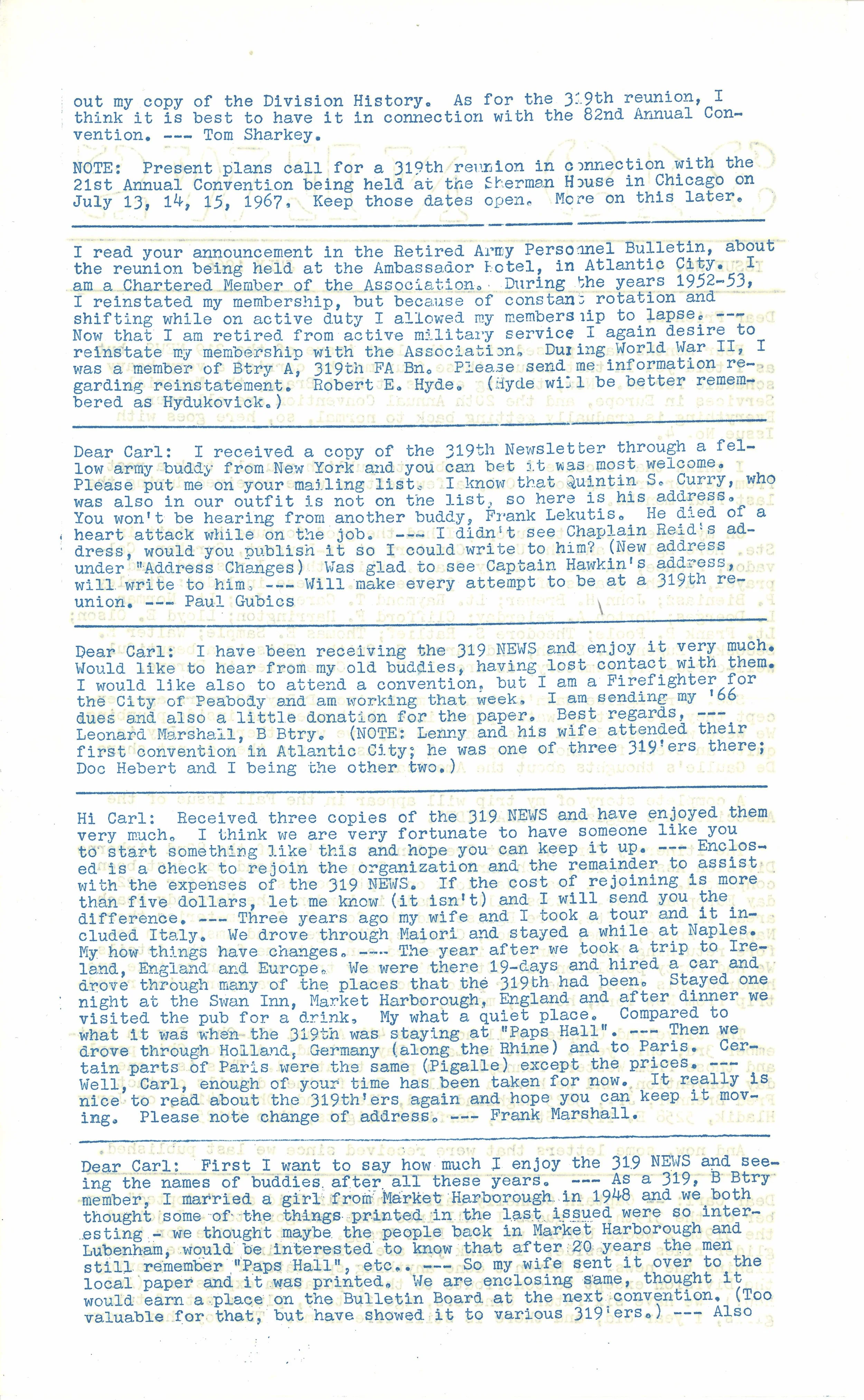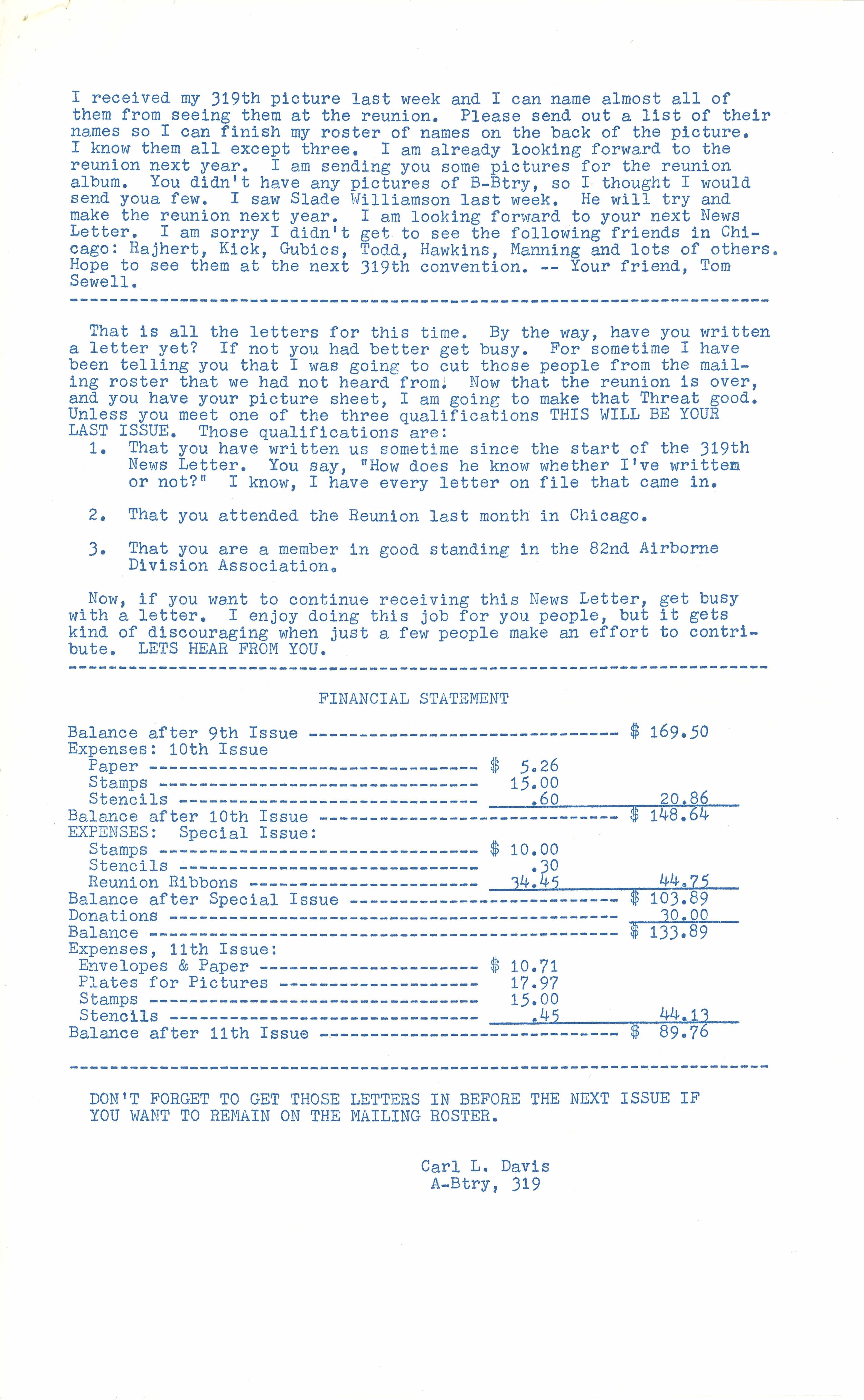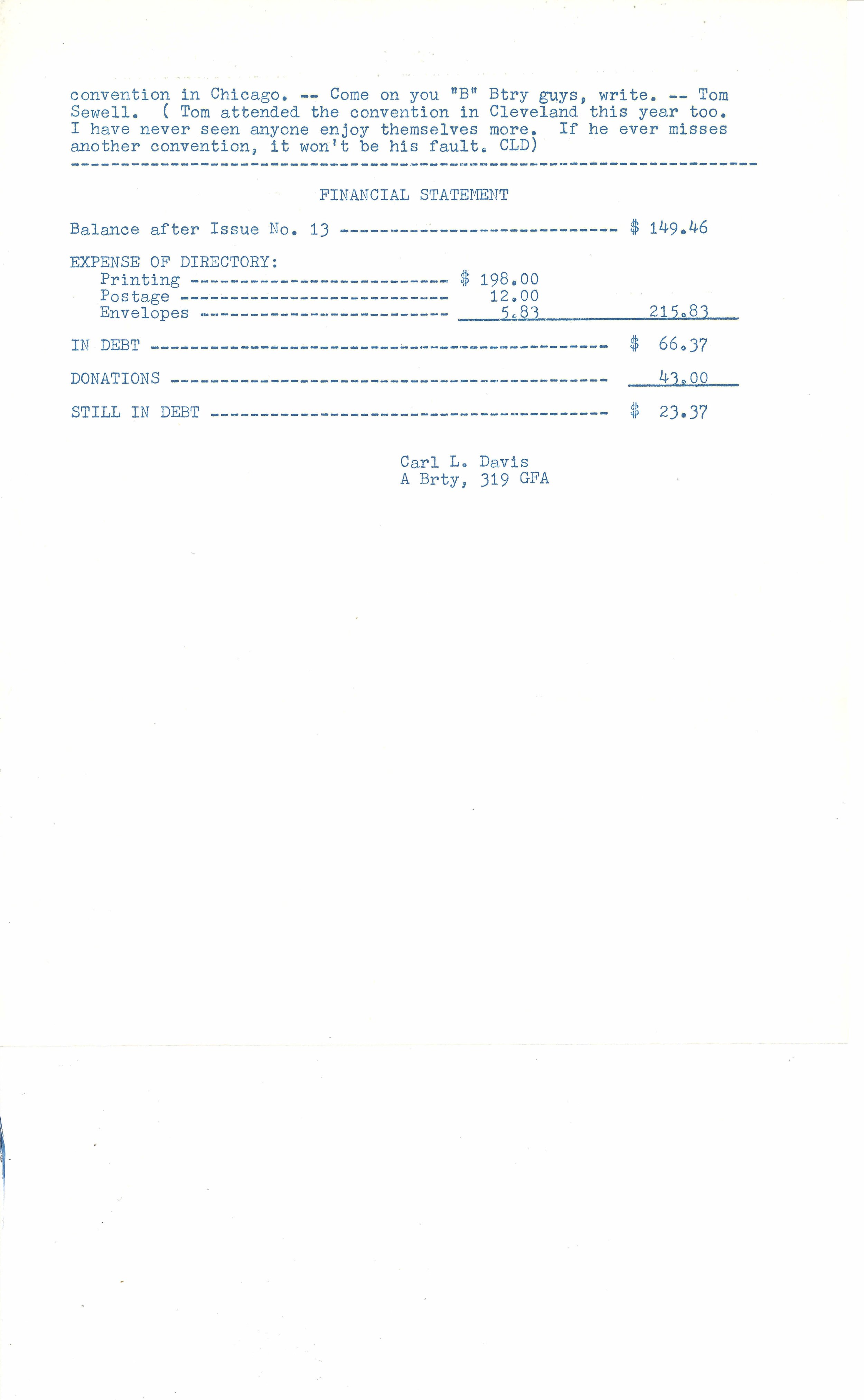319 News
“The 319 News” was a newsletter that was created in December 1965 by A-Battery veteran Carl Davis of Mansfield, Ohio. It was designed to connect the 319 Glidermen, those brave soldiers who had served together in the 319th Glider Field Artillery in Europe during World War II.
The newsletter was also a compendium of the names and addresses of the men, a vehicle for these veterans to stay in contact with one another, and to report on their civilian lives, as well as reminiscences about their wartime experiences.
The letters that Carl Davis solicited from his fellow 319 Glidermen were funny, sad, inspiring, nostalgic, and quite insightful. At the very least, “The 319 News” was a way to stay in touch with one another. Davis, in his position as Executive Secretary of the of the 82nd Airborne Division Association, felt this was particularly important given their shared experiences during the war and the deep camaraderie these veterans felt for one another.
There were a total of 20 issues of “The 319 News,” with a new issue coming out sporadically, but typically each new issue would be published every couple of months or so, depending on how many letters Davis received from his fellow Glidermen. Carl requested small donations from the other veterans to defray the cost of the postage and paper he used to create the newsletters. He also proposed a 319th reunion to his fellow Glidermen, an idea which was met with near universal approval.
The “319 News” lasted for a total of six years, from 1966 through 1971. Carl Davis bemoaned the fact that the newsletter didn’t continue longer. But as the veterans got older, or passed away, or got involved with their children’s lives, interest waned, and the newsletter quietly ended. Lord knows, Carl put his heart and soul into it. But during those six years, some wonderful recollections, anecdotes, and hilarious remembrances were shared.
Each edition contained stories from various Glidermen about their time in the army and the experiences they shared...some good, some funny, some touching, some tragic.
One A-Battery veteran named Earl Lytle Jr. wrote about specific events that took everyone “down memory lane” in newsletter issue number 3. Earl said, “The memories stand out so clearly, even after twenty years. Some of these names will bring back heartaches, some laughs, but regardless, as long as I live, I’ll never forget them.”
“At Camp Claiborne: The brass band that greeted us as we first pulled into camp. Gwaltney’s unique way of walking guard duty. Sgt. Chambers sending out for whiskey while we were on bivouac. Boom Town just outside the camp gates. Mazie, the girl who worked in the PX. DeArment, Judd and Sgt. Custer joining the paratroopers.”
“At Fort Bragg: The fellows ribbing me about Lieutenant Kinard’s favorite expression, ‘Lytle, get my jeep.’ Sgt. Peters always calling Weidner an old lady. Spainhour’s high pitched voice sounding off during calisthenics. Drinking Lessler’s whiskey – while he was off in town - and hanging the empty bottle by a string above his empty bunk. Pulling the howitzers back to camp by rope. Oscar Fields chewing on razor blades. (You can’t make this up). George ‘Moe’ Menogue making a noise like air brakes whenever he stopped his jeep. Anyone have Moe’s address? Rosensweig forever belittling Spainhour. Colonel Bertsch and Lieutenant Simpson...West Point to the core. Chandler, a quiet, red-faced lanky guy...always out of step when passing in review, his head bobbing up and down like a turkey gobbler! Laying in your bunk at night, waiting for taps, and thinking of home.”
“In North Africa: Sergeant Rafferty falling head-first from the tailgate of a 6 X 6. Spainhour and his self-devised bingo games. Captain Johnson bartering with the Arabs for eggs. Sergeant McArthur’s gun crew receiving the wrong deflection and killing a flock of sheep.”
Roland “Shorty” Combs wrote in newsletter issue number 2 that he was still unmarried, in part because he was caring for his elderly mother and father. Roland liked the idea of a 319th reunion and noted hopefully that, “Maybe I could find a wife at one of the reunions.”
In issue number 3 of the newsletter, Ed Ryan wrote to Carl Davis that he “got my 319th News and rate it as the best publication since the advent of PLAYBOY Magazine. And although I am fat and 44, I often reminisce about the great days with the 319th. I am all for a 319th reunion and would do my best to attend. Carl, I think we are all highly indebted to you for making this outfit practically your life’s work. Enclosed is a small donation.”
William J. Reid, also writing to Carl in issue number 3, said “I thank you for this thoughtful communication which makes memories brighter.” Reid was a chaplain in the war and a Methodist Minister in civilian life, married and the father of three.
Noting that the road is paved with good intentions, former Captain Charles Sartin, Jr. wrote to Carl Davis that “If this is true, I have contributed my share of concrete. I intended to write to you for years. It now appears that you have smoked a lot of us out of the woods. Therefore, with a guilty conscience for not doing my part in the past, a firm resolve to do better in the future, a sense of deep gratitude to you for all you have done for the Association and now the 319th, I am enclosing my application for renewal of membership with the Association and a check to help with the expenses of the 319 News. In 1960, I was elected Judge of our family court, and this is an election year, so during the months of June, July, and August, I’ll be up to my neck in politics. You know how we take our politics in Louisiana. Sure could use some 319thers for a little campaigning. If by some stroke of fortune I’m unopposed...I’m going to make it my business to be there (at the reunion) this year.”
In issue number 4 of the 319 News, (July 1966) Carl Davis wrote that he had recently visited Europe. “I had the good fortune to visit Sainte Mere Eglise and the U.S. cemetery at Saint Laurent Sur Mer in Calvados, France on the Normandy Coast. While there I visited and prayed at the graves of former 319th men. This is a beautiful, well cared-for cemetery as are all U.S. cemeteries in Europe. Sainte Mere Eglise hasn’t changed much since D-Day 22 years ago, except they are getting water piped into the houses and inside plumbing. We were well wined and dined the two days we were there. D-Day is quite an event for those people. I can assure you they do not share De Gaulle’s (negative) thoughts about the Americans.”
Tom Sharkey also wrote in newsletter issue number 4 that “I haven’t done anything spectacular since leaving the (82nd Airborne) Division except to contribute to the population explosion. We have six future 82nd-ers age 7 to 17, plus a set of 1-year old twin girls, and there is still life in me.” Sharkey went on to note specific random recollections from his time in the service: “Air raid in Bizerte (Tunisia)...shrapnel falling like rain. Waterproofing our jeeps and testing them out in the Mediterranean. The 376th returning from Sicily jump and Paul DeArment telling me that he could have walked from the plane to the ground on the flack the Germans threw at them, showing me his parachute to prove it.”
In Italy Sharkey recalled: “The two days I spent with Darby’s Rangers. The shock of learning that Spainhour was killed. The German artillery and mortars at Chiunzi Pass. My first view of Mount Vesuvius. Carl Davis and Robert Smith awarded Silver Stars for heroism during the ammunition fire at Chiunzi Pass. The Italian kids at the end of our chow line pleading for food. Jesse Holman’s iron hand rule over his drivers. Giving out candy to kids at Christmas time. In England: Putting knit caps on the statues outside Pap (Papillon) Hall and watching Major Wilcoxson blow his cork when he spotted them. Duplechain’s hilarious imitation of Major Wilcoxson. Dearwester’s one-man tailor and laundry business. Driving to Leicester on garbage detail with Mess Sergeant Siegel, by way of his girlfriend’s house.”
In France: “The satisfied feeling of seeing our fighter cover. The burning pill boxes on the French coast. Hornyak and his underground switchboard. Eugene Smith’s pride when he mentioned his girlfriend in Akron, Ohio. Lieutenant Carey and Lieutenant Poole both killed – real nice guys. Our artillery serenade to the Germans, on July 4th just outside of Saint Lo. The high German towers on the cliffs overlooking Normandy Beach. The emotional welcome we received when we arrived back at Papillon Hall.”
In 319 News issue number 7, veteran Hans Mengering wrote that “The other day I took some copies of the 319th News to the office. All the veterans there were very envious. They wish their old outfits would do the same. After all, one of the good things about our stretch in the service was the good bunch of guys we worked with. Something most of us did not realize until too late. As you know, I ‘retired’ from the 319th as we landed near Sainte Mere Eglise. It is funny, but most people thought I was dead. The first inkling I had of this was at the first convention in Chicago. It was on an elevator in the Old Stevens Hotel. Doc Hebert walked in, and I noticed that his face turned white as a sheet. He asked my name, and I told him. All he could say was ‘I thought I had seen a ghost.’ That evening, he signed my banquet menu with that statement. After my ‘retirement,’ I spent 21 months in Army hospitals as a patient. I still hear from some of the nurses I met.”
The founder of “The 319 News,” Carl Lester Davis, enlisted in the U.S. Army in March of 1942. The 28-year old received his military training at Camp Claiborne, Louisiana and Fort Sill, Oklahoma.
While stationed at Camp Claiborne, then Corporal Davis first got involved in establishing a USO Club in Ohio. Davis felt these clubs made an ideal meeting place for enlisted men and began a fund-raising campaign to establish a club in his hometown of Mansfield.
Davis always seemed to get involved with some aspect of communications during his years in the service, and afterwards.
A brave soldier, Davis traveled to North Africa in 1943 and fought in seven military campaigns: Sicily, Naples-Foggia, Normandy, Northern France, the Ardennes, Rhineland, and Central Europe.
Carl Davis distinguished himself many times in combat. In the mountainous Chiunzi Pass overlooking Naples, Italy, A-Battery’s ammunition store was set ablaze by enemy mortar and 88mm artillery fire. Without hesitation, Davis extinguished the flames and saved what remained of the 319th’s supply of ammunition.
Promoted to sergeant, Davis refused a battlefield commission (which would have elevated him to Lieutenant) during the tense fighting in Normandy, France. He understood that to accept such a commission would cause him to be transferred out of A-Battery. Quiet and unassuming by nature, and loyal to a fault, Carl was unwilling to leave his battery, even to become an officer. In September of 1944, Sergeant Davis was promoted to Staff Sergeant Davis.
Carl Davis was considered by many to be the unofficial historian of the 319th Glider Division and took hundreds of photographs during the war, which he generously shared with others.
A fellow veteran, Howard Fitchtner, wrote: “I think we were all closer together in our misery at those times than any other...real friendships were made, and fond memories were forged.” The newsletter founded by Carl Davis rekindled those indelible memories.
Carl Lester Davis passed away in August of 1994, at the age of 82. God bless this fine man, a true American hero.
Below you will find the original 319 News Letter in order by date, presented in a slideshow fashion, and side controls to the next or previous image. Courtesy of the Andrew Hawkins family.



































































